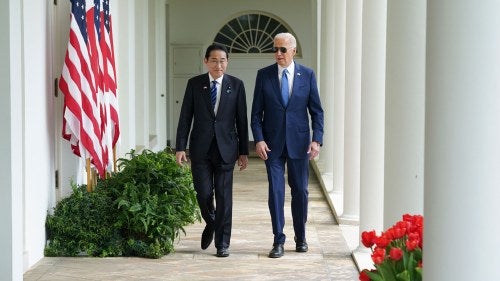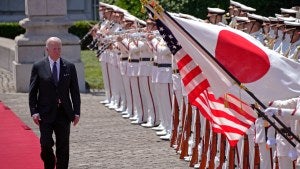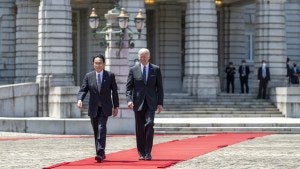What Americans Think About the US-Japan Relationship

As US President Joe Biden hosts Japanese Prime Minister Fumio Kishida for a state visit, here’s what to know about US attitudes toward the alliance.
The United States and Japan are critical strategic allies in the Asia-Pacific and increasingly dependent on each other, particularly as both face the prospect of a more powerful and assertive Chinese foreign policy. This close bond is in the headlines this week as Japanese Prime Minister Fumio Kishida visits the United States for an official state visit. In addition to meeting with US President Joe Biden, Kishida will address a joint session of Congress, highlight Japanese investments in US manufacturing, and join Biden for a trilateral US-Japan-Philippines leaders’ summit.
As Kishida’s visit kicks off, here are three things you should know about how the American public thinks about Japan and the US-Japan relationship.
1. Americans view Japan favorably and have confidence in Japan’s actions
Kishida comes to the United States at a time when public esteem for Japan is quite high: 83 percent of Americans view Japan favorably, per a February 2024 Gallup poll. Most Americans also say they have either a great deal (15%) or a fair amount (47%) of confidence in Japan to deal responsibly with world problems. Japan remains one of the most trusted nations for the American public, and the most trusted nation in Asia by a notable margin. And interestingly, younger Americans (ages 18–29) are nearly as likely to have confidence in Japan to deal with world problems (62%) as they are in the United States (67%)!
2. Americans support basing US troops in Japan and see the relationship as good for US national security
A large majority of Americans (77%) say that the US-Japan relationship does more to strengthen US national security than it does to weaken it (19%). This view is similarly shared across party lines, with large majorities of Democrats (81%), Republicans (76%), and Independents (74%) all viewing the US-Japan security relationship as beneficial to US national security.
One reason Americans may see the US-Japan relationship as good for US security is the long-term bases the United States maintains in Japanese territory. As the 2023 Chicago Council Survey finds, a majority of Americans (63%) say that the United States should have bases in Japan, continuing the trend of high levels of public support for bases in the country.
3. In the US-Japan alliance, Americans are focused on regional security challenges
Regional security issues—including North Korea and China—will be high on the agenda for Kishida’s meetings with Biden this week. That matches the American public’s priorities as well.
Nearly eight in 10 (79%) say that limiting North Korea’s nuclear program is a very or somewhat high priority for the US-Japan alliance. However, that doesn’t mean Americans are aiming at regime change in North Korea: only 48 percent of Americans say that should be a priority for the alliance.
What is a top priority for the US public: limiting the rise of China’s power. Three in four Americans (74%) say this is a priority for the alliance, matching Americans’ growing concerns over China.
Also on the agenda: a militarily stronger Japan. Seven in 10 Americans (71%) say that encouraging Japan to spend more on its own defense is a priority for the alliance.
Lastly, while Kishida will spend some of his visit touting Japanese investment in the United States, this isn’t as high a priority for Americans as the regional security issues getting top billing. Only 48 percent of Americans say that increasing Japanese investment in the United States should be a very (13%) or somewhat (36%) high priority for the alliance.
Go Further
Want to learn more about Kishida’s US visit and the deep relationship between the United States and Japan? Check out our recent event on the 21st-century US-Japan relationship covering the political and strategic relationship, as well as the cultural and economic bonds between the two nations.


Related Content
 Public Opinion
Public Opinion
The US public views the Japan alliance as a significant national security benefit as concerns about China grow.
 Public Opinion
Public Opinion
Survey results reveal how Japanese perceptions of security in East Asia have changed following Russia's invasion of Ukraine.
 Public Opinion
Public Opinion
This report says that Americans remain supportive of the US military presence in Japan.
 Public Opinion
Public Opinion
New data from the Japan Institute of International Affairs and the Council offer insights on how publics in the United States and Japan view the relationship between their countries.
